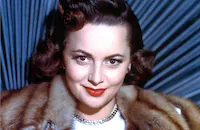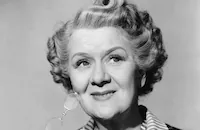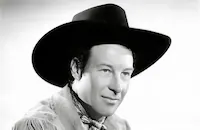Alibi Ike

Brief Synopsis
Cast & Crew
Ray Enright
Joe E. Brown
Olivia De Havilland
Ruth Donnelly
Roscoe Karns
William Frawley
Film Details
Technical Specs

Synopsis
The Chicago Cubs have been doing badly, and Cap, the coach, must win the pennant to keep his job. His only hope is rookie pitcher Frank X. Farrell, who still hasn't arrived for spring training. When Frank finally does arrive, he has several stories about why he is late. Frank cannot tell the truth about anything, but he is a terrific player and charms Dolly Stevens, Cap's sister-in-law. Dolly and Frank fall in love, but soon she leaves for home. They correspond, and when his teammates tease him about his letters, Frank denies that they are from Dolly. Still, he decides to buy her a ring, but again, he pretends that it is for his sister and not for Dolly. Frank's great pitching attracts the attention of some gamblers. They threaten to break his arm if he refuses to throw the next two games, and to save himself, he agrees. When Dolly returns, Frank manages to ask her to marry him. She accepts, but when she overhears him denying that he really loves her in front of the other ball players, she gets mad, breaks off the engagement, and leaves town. Frank is so unhappy that he loses the next game, but Cap believes he lost on purpose. Cap's wife Bess is convinced that he is only heartbroken over Dolly and promises Frank that she will get Dolly back if he will set up the gamblers. Before he can do that, the gamblers find out he is going to double-cross them and kidnap him. During the game, the Cubs play poorly without Frank. He manages to escape from the gamblers and makes it to the stadium for the ninth inning. Aided by Frank's pitching, the Cubs tie the score. Then Frank hits a home run and wins the game. Frank marries Dolly and promises never to lie again.

Director
Ray Enright
Cast

Joe E. Brown

Olivia De Havilland

Ruth Donnelly
Roscoe Karns

William Frawley
Eddie Shubert

Paul Harvey
Joseph King

Joseph Crehan
G. Pat Collins
Spencer Charters
Gene Morgan
Adrian Rosley
Jack Norton
Cliff Saum
George Riley
Samuel R. Mcdaniel
Jed Prouty
Jack Cheatham
Eddy Chandler
Bruce Mitchell
Grover Liggon
Wade Boteler
James Cane
Junior Coghlan
Milton Kibbee

Gordon Elliott

Wilfred Lucas
Dick Winslow
Fred "snowflake" Toones
Huey White
Crew

Film Details
Technical Specs

Articles
Alibi Ike
Brown, whose penchant for the sport nearly won him a spot with the New York Yankees in the mid-1920s, had a clause in his contract that allowed him to form his own Warner Brothers studio team: the Joe E. Brown All-Stars. The satchel-mouthed comedian was also part owner of the Kansas City Blues, and his fanaticism to the game is evidenced by the casting of no less than 25 all-time greats throughout the picture, including Bob Meusel, Archie Campbell and Herman Bell. Enright's neat melding of howling guffaws with exciting last inning cheers (with a remarkably agile Brown doing all his own baseball action) delighted both critics and fans, and additionally served as an ideal showcase for young newcomer Olivia de Havilland, cast as Brown's sweetheart.
Upon its release, Alibi Ike's star became his studio's MVP when the New York Times' Frank Nugent likened Brown "...to Warners what Garbo is to Metro and Shirley Temple to Fox..." As for Enright, his frantic timing skills filled his future busy schedule with two other genres: the war movie (realistically utilizing his WWI tenure with the American Expeditionary Forces) and the Western. In the latter genre, he became a favorite director of Randolph Scott's after working with the actor on the 1942 remake of The Spoilers. Scott specifically requested the now tagged "action specialist" no less than a half dozen times - a successful on-going alliance ended only by the veteran director's retirement in the early 1950s.
Producer: Edward Chodorov
Director: Ray Enright
Screenplay: William Wister Haines, Ring Lardner (story)
Cinematography: Arthur L. Todd
Film Editing: Thomas Pratt
Principal Cast: Joe E. Brown (Frank X. Farrell), Olivia de Havilland (Dolly Stevens), Ruth Donnelly (Bess), Roscoe Karns (Cary), William Frawley (Cap), Eddie Shubert (Jack Mack).
BW-73m. Close captioning.
by Mel Neuhaus

Alibi Ike
Quotes
Trivia
Notes
Ring Lardner's short story was also published in Round-up: The Stories of Ring W. Lardner (New York, 1929). The movie was filmed on location in Fullerton, CA., the spring training grounds of the Hollywood team of the Pacific Coast League.















